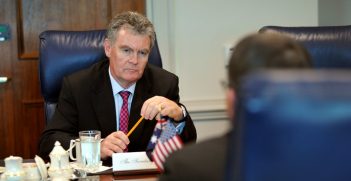As armed conflict decreases in frequency and magnitude, non-violent statecraft is becoming the new means of inter-state dispute resolution. But what implications does this have?
The original “states versus markets” debate was concerned with creating an optimal model of economic development for the post-war era. Was an economy overseen by a powerful interventionist state, and only conditionally open to international trade and capital flows, better suited to early- and mid-stage industrialisation than a lightly regulated and internationally open free market alternative?While “market” orthodoxy prevailed during the heyday of the Washington Consensus in the mid-1990s, the “state” has slowly been clawing its way back since. Mainstream economic thinking now acknowledges that unfettered laissez-faire practices failed emerging markets, a view strengthened and broadened amid the rich-world imbalances that gave rise to the 2008–09 global financial crisis.China today offers a distinct state-led alternative to Western models of economic development. The logic of the “Beijing Consensus” is to employ capitalist forces as the engine of growth and poverty reduction, while the government retains the authority to intervene as it sees fit.China’s economic structure is not unique historically — it shares many features with the developmentalist states of East Asia that enjoyed so much success in the post-war era. Now that China’s economy rivals that of the United States in size, the Chinese Communist Party believes, and is arguing to the world, that its model of political order and economic development offers an attractive and perhaps superior model compared with that offered by the West.This means that Beijing’s frequent use of economic statecraft in its foreign policy, where targeted market interventions — both carrots and sticks — are employed to further Beijing’s strategic interests, is even more consequential in its impact on international relations. China’s state-driven approach offers emerging market economies an appealing pathway to prosperity and also an apparently potent means of achieving influence on the global stage.At a time when Beijing is perceived to be a strategic rival of Washington and great power competition is again a central feature of world politics, China’s economic statecraft is expanding the definition and scope of the concept of national security. As Beijing and Washington come to perceive more and more economic domains — including trade, technology and education — as matters that touch upon broader national interests, each government is demonstrating an increasing willingness to intervene in markets to advance its national security objectives.US–China rivalry is normalising the use of economics as a matter of national security, giving rise to what has been described as a geoeconomic world order that other states may feel impelled to follow. By this logic, economic statecraft is framed as “geoeconomics”: it is not simply about wielding narrow influence on a given issue, but directing economic activity towards grand strategy and the maximisation of national power.Donald Trump’s trade war is an obvious example of the state crimping markets in the name of a broader national interest. Yet it is Trump’s recent edict to US companies to relocate operations from China to the United States that reveals a mind-set much closer to the Chinese model than to neoliberal economic orthodoxies. On both the Republican and Democratic sides of politics, calls for an activist industrial policy are becoming more mainstream, cementing a shift away from free markets.The state-led approach is also receiving support from a third vector: the rise of populist, nationalist and/or anti-establishment political movements across both the West and the developing world. These movements are steered by leaders who mobilise grievances wrought by globalisation, technological progress and social upheaval as justifications for radical policy agendas.
These three forces — the perceived success of the Chinese model, the securitisation of economic policy amid great power rivalry, and the rise of anti-establishment politics in the West — are increasing both the attraction and legitimacy of greater state power over markets.
To take one recent example: in July the Japanese government tightened controls on exports of three chemicals used in South Korea to manufacture semiconductors and smartphones. The Japanese government relied upon national security justifications, claiming concern that some of the materials could be converted for use in weapons. It is widely assumed, however, that the decision was actually related to a long-running dispute between the two countries over wartime compensation claims. Seoul retaliated by cancelling an intelligence-sharing agreement with Tokyo, thereby fully bringing a political dispute from the economic into the security realm.
As armed conflict declines in frequency and magnitude, perhaps one should celebrate the tendency for states to use non-violent means like economic statecraft to prosecute their political interests — but this does come at a cost. More interventions will mean more market distortions and more uncertainty for businesses. This could have profound impacts on global supply chains which rely on the free flow of components across borders.
As national security pressures grow, governments will increasingly take defensive countermeasures to minimise their vulnerability to economic statecraft deployed by their strategic competitors, as we are seeing with the decoupling debate in the United States and concerns in Australia about overdependence on China.
Darren J Lim is a Senior Lecturer in international relations at the School of Politics and International Relations, at the Australian National University.
This article appears in the most recent edition of East Asia Forum Quarterly, “Economics and security,” Vol. 11 No. 4. It is republished with permission.






